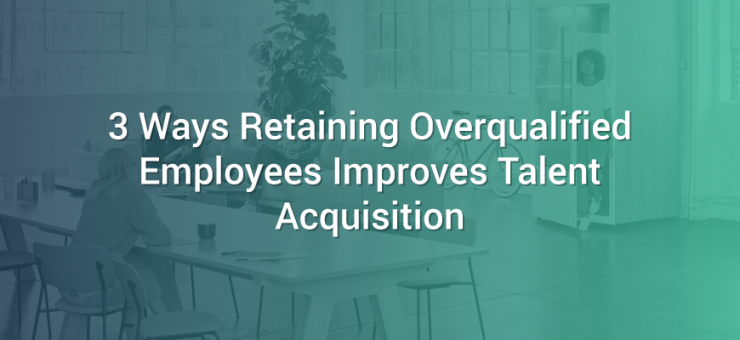There’s a new crisis in talent acquisition and, for once, it has nothing to do with the skills gap. Actually, it’s just the opposite. Our latest report, The Risks and Rewards of Hiring Overqualified Talent revealed 70.7 percent of hiring pros agree with the statement, “the number of overqualified talent in today’s job market complicates filling entry-level roles.”
The job market is saturated with overqualified workers, as millennials — currently the largest generation in the workforce — become the most educated generation.
In fact, a new Deloitte report revealed that compared to baby boomers, 4 percent more male millennials and 13 percent more female millennials have completed bachelor’s degrees. Yet the same report found only about half of those who have a college degree work in a job that requires one.
While filling entry-level roles presents a new challenge for talent acquisition, 68.7 percent of respondents identified employees currently working at their organization who are overqualified for their roles. This comes as no surprise considering 81.1 percent agree overqualified employees are beneficial to the company.
The real issue is the number of overqualified candidates in the workforce will remain at critical status until it’s fully understood how to retain overqualified employees. Here’s a quick breakdown of the impact of overqualified talent retention on talent acquisition:
Improved team morale
You usually gauge engagement by your team’s confidence and enthusiasm. However, just one employee’s negative attitude can cause team morale to plummet. A domino effect of decreased engagement, satisfaction, and retention inevitably follows.
Just like any other employee, overqualified candidates enter new roles motivated to succeed. As a matter of fact, overqualified talent is reported to quickly train for and learn their new positions, according to 41.9 percent of hiring pros in our recent report.
Their quick acclimation is typically a motivator and provides a morale boost for employees who were picking up the slack while the role was open. However, that enthusiasm quickly declines when overqualified employees become frustrated in their new role.
The key to keeping morale high is to go back to where the excitement all began — the hiring process. Look at what motivated overqualified employees to join your team. What elements of their enthusiasm struck you during the interview, influencing your team’s decision to hire them?
You should regularly reference these basic but critical details to keep employee and team morale high.
Information from the interview reveals how the role or company excited overqualified talent as candidates, guiding the ways you keep them engaged. Still, you should keep track of what drives overqualified employees over time by routinely collecting feedback. You can also use this information to guide interview questions when hiring overqualified talent for new open roles.
Improved team performance
Productive teams are made up of highly-invested employees. Your entire team’s effectiveness suffers when just one person underperforms. Unfortunately, just over a third (35.3 percent) of hiring pros in our recent report say overqualified employees are more likely to grow bored and underperform.
Boredom occurs in the absence of challenges. Because overqualified employees are so quick to outgrow their roles, you must constantly search for new ways to spark their interest. If they’ve accomplished everything they can in their current position, identify tasks where they can apply skills outside their job description.
Recall what you learned from the hiring process to uncover overqualified employees’ passions. Use this information to give them new responsibilities. For example, many overqualified employees are prepared to teach new skills to other employees, according to 41.5 percent of hiring pros in our report.
If you know an overqualified employee is passionate about helping others, determine what areas they’re qualified to mentor their peers. Ensuring overqualified employees feel challenged by their roles and are applying their skills in a rewarding way, ultimately, drives the entire team’s performance forward.
Improved in company image
Many overqualified employees know their worth. They’re confident in their skills and ability to move up in the company. Hiring pros in our report noticed those who stick around are more likely to frequently request promotions and raises (31.3 percent).
Of course, ambition is a positive employee quality. Unfortunately, when requests are frequently not met, the likelihood of frustration or even resentment increases. Unhappy employees are likely to share the company’s inability or unwillingness to meet their needs with friends, family, even people in their professional network, undoubtedly affecting future talent acquisition efforts.
While promotions and raises may not be in your company’s budget at the moment, you can retain overqualified talent by simply communicating. In fact, the majority (86.5 percent) of talent acquisition pros in our recent study said they keep communication open by regularly collecting employee feedback, and another 30 percent said they are focusing on overqualified talents’ futures.
Listening to overqualified talent and showing you are invested in their goals reduces the risk of them moving on to other offers. Map out the company’s capabilities with overqualified candidates. Share specific details on typical or structured salary increases with estimated times for promotions. Emphasize candidate potential to realistically determine how long it will take to fulfill their career goals with your company.












